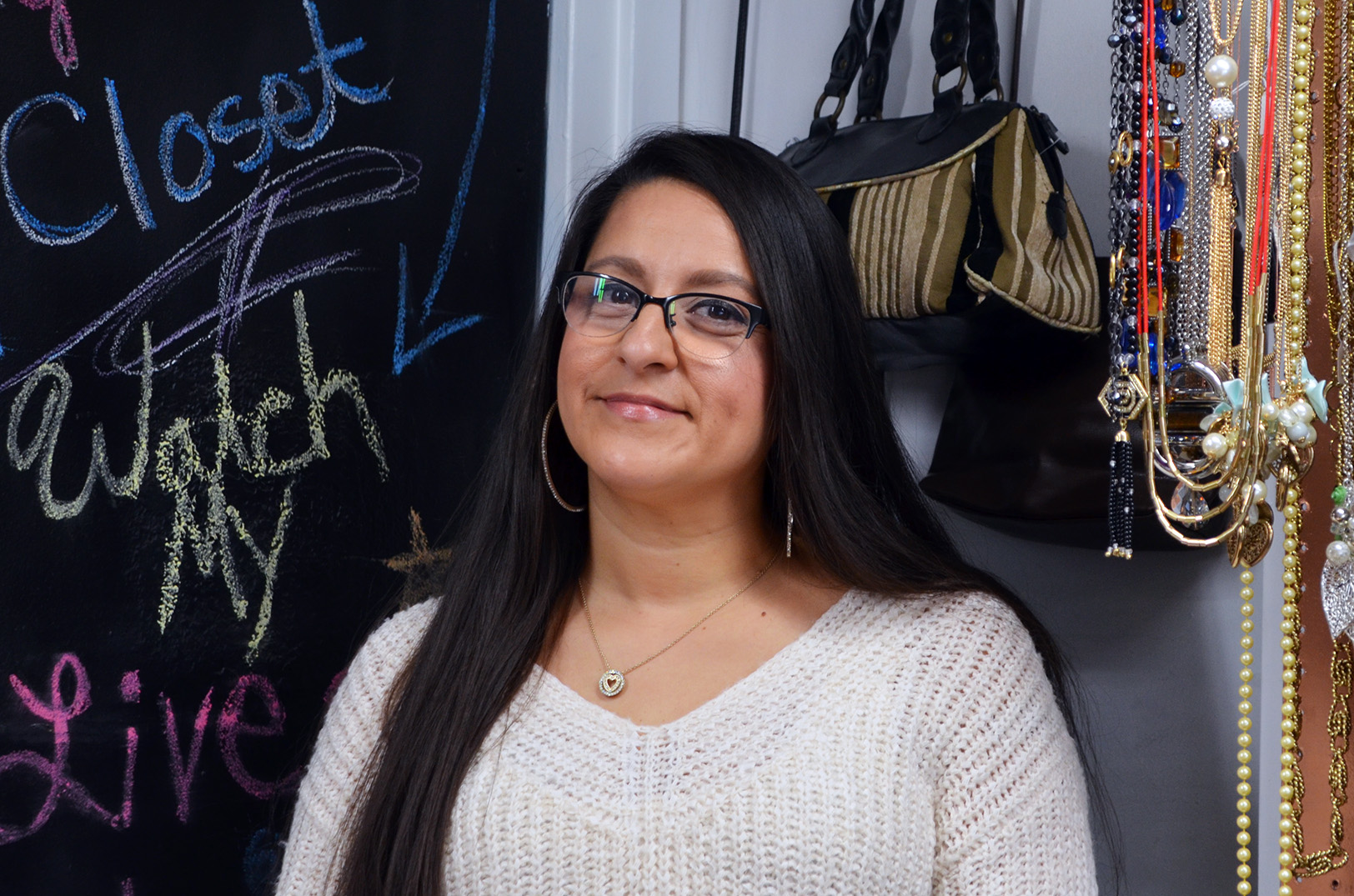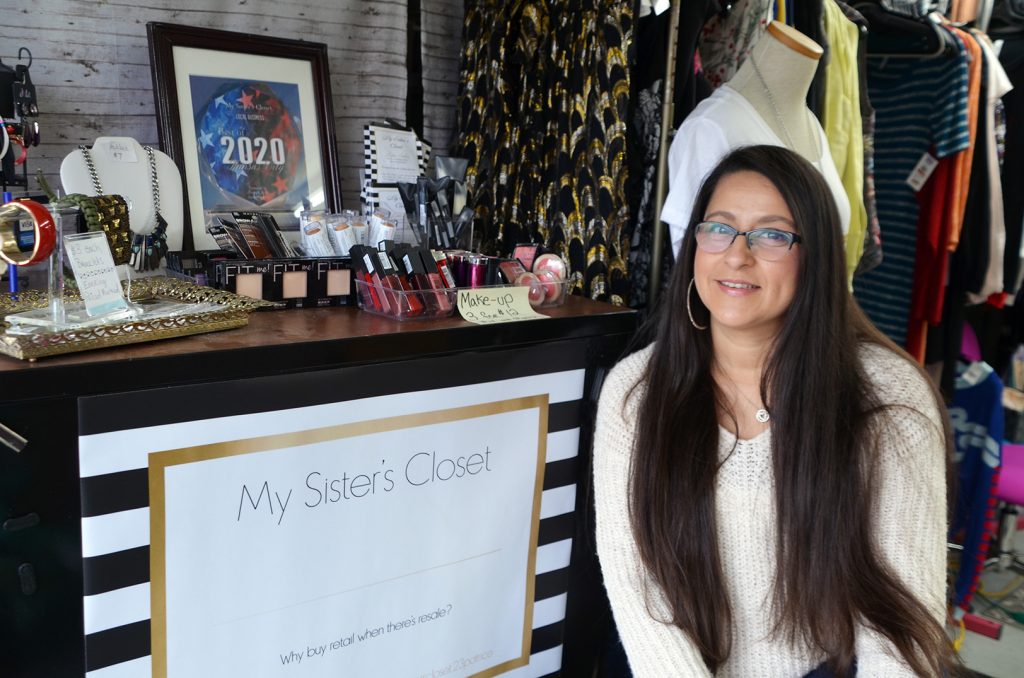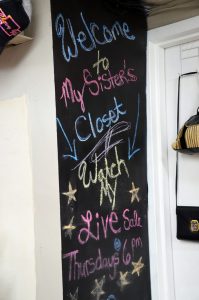Editor’s note: This article is underwritten by Plexpod — a progressive coworking platform offering next generation workspace for entrepreneurs, startups, and growth-stage companies of all sizes — but was independently produced by Startland News.
Hand-me-downs were both a blessing and a curse for Patrice Aguilera, she said. Growing up as the youngest and tallest of six sisters, Aguilera recalled her clothes never quite fit.
“That was until my older sister was able to start buying me clothes,” said Aguilera, adding that her childhood sparked a lifelong passion. “I knew that I wanted to give back to people who couldn’t buy clothes and provide good, name-brand clothing that was affordable.”
Decades later, the Latina consignment shop owner is designing a business model that not only fits her lifestyle and family commitments, but is the right size for the community she serves, Aguilera said.
Rooted in her own personal achievements and shaped by setbacks, the all-virtual My Sister’s Closet — a venture begun long before the COVID-19 pandemic — has become Aguilera’s livelihood, as well her way of expanding entrepreneurship within Kansas City’s underserved Hispanic community.
Brick-and-mortar foundation fades
Inspired by “shopping” within her sister’s literal closets, Aguilera opened a physical storefront version of My Sister’s Closet in 2011. (It was her second consignment shop; An earlier business, “The Exchange,” opened several years prior, but Aguilera decided to close it after four years when she realized her eldest son was essentially being raised in the shop, she shared.)
“My Sister’s Closet was on 47th Street and right next to a high school,” Aguilera said. “It was a lower-income high school, so I was able to really connect with them and provide a cheaper way of shopping for school clothes.”
Another successful four years passed, Aguilera recalled, when she was diagnosed with Fibromyalgia — a condition that affects the muscles and causes widespread pain, fatigue and sleep problems. Preferring to do everything by herself, Aguilera’s stress caught up to her physical health, she explained.
Juggling the store with being a mother of five, Aguilera decided once again to close her shop and start working from home.
“I did picture sales; I did Poshmark; I did booth sales. I was making a living. And then I got a divorce,” Aguilera said, candidly noting she needed to find a way to be able to pay for her mortgage and other bills.
“Thank God ‘Live’ came my direction.”
Going (Facebook) Live
Facebook Live launched in 2016, allowing users to stream real-time videos onto their social media accounts. Excited to utilize the platform, Aguilera said she spent several months studying how others were conducting businesses on the platform.
“I took a whole summer of watching and preparing my shop, then set a date and went for it,” Aguilera said. “Now, I’ve been doing [Facebook] Lives for over two years, and I’ve done over 140-something Lives. It’s really taken off.”
My Sister’s Closet now operates solely across Facebook Live shows where Aguilera presents her inventory, and viewers can purchase products in the comments. Watch a previous live show here.
Being fully online has been extremely beneficial during the COVID-19 pandemic, Aguilera said.
Wanting to share her business model and expertise with other small business owners, Aguilera started a My Sister’s Master Class centered around selling products on Facebook Live.
“I never thought that teaching would be my thing,” Aguilera admitted. “But I’m enjoying it and enjoying seeing their businesses take off — it feels wonderful.”
Within her first month launching the program, 14 clients took Aguilera’s course. A waiting list already has formed for 2021. The three-session My Sister’s Master Class is $80. Those interested in taking Aguilera’s master class can message her on the My Sister’s Closet facebook page.
Turning points
Before her entrepreneurial venture with My Sister’s Closet, Aguilera worked for a toy store chain for five years — in later years twice serving as a shop manager.
Aguilera recalled being repeatedly denied a salary position, only receiving small raises throughout the year. Shortly before she ultimately quit, the chain hired an assistant for Aguilera, she said.
“The assistant was an older Caucasian lady, and I heard her on the phone the day she got hired, telling her daughter that she got a salary,” Aguilera shared. “I went straight to my boss’ office, and I told him I needed to get a salary, because my assistant is getting a salary, and she just started. He wouldn’t give it to me.
“I quit that day,” she continued. “It was a big turning point in my life. I really loved that job. I love sales, but he just wouldn’t appreciate me for who I was. I don’t know if it was because I was young; I don’t know if it was because I am Hispanic.”
For others — especially women of color — who may be caught in the same position as Aguilera was, she encourages them to face fear head on and learn from their obstacles, as her toy store experience taught her the ins and outs of running a business.
“Every time we get really scared about a goal we’re about to attempt, it’s usually because we’re about to break some barriers and achieve something that’s groundbreaking for us,” Aguilera said. “I’ve had to jump in with both feet and keep going. Have faith in yourself, know your self-worth.”
Aguilera’s family keeps My Sister’s Closet running smoothly, she said, noting she no longer feels like she has to do it all on her own.
“My sister is behind the scenes with me; she’s my assistant. My son, he helps me with [custom shirt] prints,” Aguilera shared, noting that her nephew also helps her with inventory.
Two of Aguilera’s daughters also run their own small business, which Aguilera is proud to help them with, she added.
“We’re all in this together,” Aguilera said, smiling. “I want them to be entrepreneurs too. I want them to not have to rely on somebody else. Because when you work for yourself, you can push your business in the directions you want to.”










































